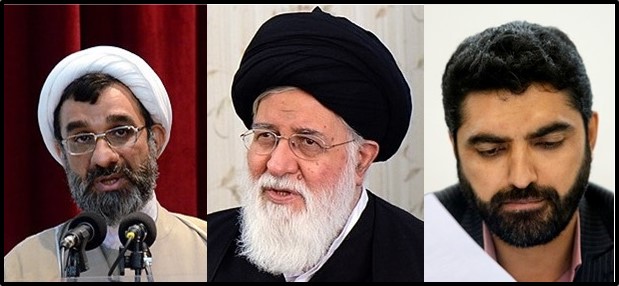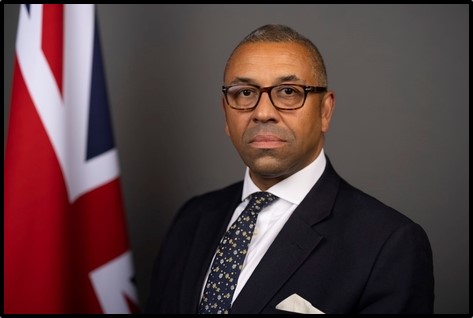On March 20, the European Union sanctioned eight men and one organization, and Britain designated seven men for human rights abuses, particularly during the nationwide protests that erupted in September 2022. The designations reflected growing international disgust over the Islamic Republic’s rights violations. In a statement, the European Union called on Tehran to “end the practice of imposing and carrying out death sentences against protesters, reverse the death penalty sentences pronounces, as well as provide due process to all detainees.”

The list issued by the European Union—a bloc of 27 nations including some of the world’s largest economies—included judiciary officials, a member of parliament, and the Friday prayer imam in Mashhad, Iran's second-largest city. It also designated the Supreme Council of the Cultural Revolution, which forms policies on science, education, religion, and research. The E.U. sanctions were the sixth round imposed between October 2022 and March 2023. The E.U. sanctions:
- Abdol Hossein Khosrou Panah, chairman and secretary of the Supreme Council of the Cultural Revolution
- Ahmad Alam-al Hoda, Friday prayer imam for Mashhad and member of the Assembly of Experts, an elected body of 86 senior Islamic jurists and clerics that can select and dismiss the supreme leader
- Ahmad Rastineh, member of Parliament and parliamentary cultural commission spokesperson
- Hojatoleslam Ali Khan Mohammadi, spokesperson of the Headquarters for Enjoining Right and Forbidding Evil, which has enforced mandatory dress codes for women
- Mohammad Sadegh Akbari, chief justice of Mazandaran province
- Morteza Barati, Revolutionary Court judge in Isfahan
- Musa Asif Al Hosseini, Revolutionary Court judge in Karaj, Alborz province
- Vahid Jalili, chief for cultural affairs and policy evolution at the state-run Islamic Republic of Iran Broadcasting (IRIB)
- The Supreme Council of the Cultural Revolution, a government policymaking body concerned with science, education, religion, and research policy
In an independent move, Britain targeted financiers of the Islamic Revolutionary Guard Corps (IRGC). Five men on the British list worked with the IRGC Cooperative Foundation, which supports Iran’s foreign operations and proxies. The foundation also serves as a slush fund for military personnel and their business interests, according to a U.S. Treasury statement in January 2023. The other two men cited by Britain were IRGC commanders in Tehran and Alborz provinces.
Britain targeted “senior leaders within the IRGC who are responsible for funneling money into the regime’s brutal repression,” said Foreign Secretary James Cleverly. “Together with our partners around the world, we will continue to stand with the Iranian people as they call for fundamental change in Iran.” Between October 2022 and March 2023, Britain listed more than a dozen senior IRGC officials. British sanctions:
- Ali Asghar Nourouzi, chairman of the IRGC Cooperative Foundation board of directors
- Seyyed Aminollah Emami Tabatabai, vice chairman of the IRGC Cooperative Foundation board of directors
- Yahya Ala’Oddini, director of the board of the IRGC Cooperative Foundation
- Jamal Babamoradi, director of the board of the IRGC Cooperative Foundation
- Ahmad Karimi, director of the board of the IRGC Cooperative Foundation
- Ahmed Zulqadr, commander of the IRGC Seyyed al Shohada Provincial Corps in Tehran Province and deputy commander of IRGC in Tehran City
- Alireza Heydarnia, commander of the IRGC in Alborz Province
The sanctions by both countries froze all assets of the designated people and entities and banned all travel to the 28 countries. The E.U. measures also prohibited anyone from providing funds or resources to those sanctioned. The following are statements from the European Union and Britain.
European Union
Today, the Council decided to impose restrictive measures on additional 8 individuals and one entity responsible for serious human rights violations in Iran.
In particular, the Council is sanctioning members of the judiciary responsible for handing down death sentences in unfair trials and for the torturing of convicts.
It is also sanctioning:
- conservative clerics undermining the freedom of girls and women or propagating hate against women
- a member of the Iranian Parliament (Madjles) and its spokesman for the cultural commission
- the spokesman of the EU-listed Headquarters for Enjoining Right and Forbidding Evil
- the Supreme Council of Cultural Revolution, a body which promoted several projects undermining the freedom of girls and women and discriminating minorities.
- the chief for cultural affairs and policy evolution at EU-listed Islamic Republic of Iran Broadcasting (IRIB), which broadcasted forced confessions from foreign hostages during the 2022/2023 protests.
 Restrictive measures now apply to a total of 204 individuals and 34 entities. They consist of an asset freeze, a travel ban to the EU and a prohibition to make funds or economic resources available to those listed. A ban on exports to Iran of equipment which might be used for internal repression and of equipment for monitoring telecommunications is also in place.
Restrictive measures now apply to a total of 204 individuals and 34 entities. They consist of an asset freeze, a travel ban to the EU and a prohibition to make funds or economic resources available to those listed. A ban on exports to Iran of equipment which might be used for internal repression and of equipment for monitoring telecommunications is also in place.
The European Union and its member states urge the Iranian authorities to stop the violent crackdown against peaceful protests, cease their resort to arbitrary detentions as a means of silencing critical voices, and release all those unjustly detained.
The EU calls on Iran to end the practice of imposing and carrying out death sentences against protesters, reverse the death penalty sentences pronounced, as well as provide due process to all detainees. The EU also calls upon Iran to end the distressing practice of detaining foreign civilians with a view to making political gains.
Today’s package of listings follows the previous five adopted by the Council on 17 October, 14 November, 12 December, 23 January and 20 February.
The relevant legal acts have been published in the Official Journal of the EU.
British Foreign, Commonwealth & Development Office
The UK has imposed sanctions on senior officials of the Islamic Revolutionary Guard Corps, it announced today.
The IRGC, the branch of the Iranian Armed Forces responsible for the internal and external security of Iran, has been at the forefront of the repression of protest in Iran which has seen more than 500 killed and tens of thousands imprisoned.
The UK has sanctions in place on the IRGC in its entirety. Since October, the UK has imposed new sanctions on more than a dozen senior IRGC officials under our Iran human rights regime, most recently on a number of senior commanders on 20 February.

As a result the UK has sanctioned five members of the Board of Directors of the IRGC Co-operative Foundation, an economic conglomerate established by senior IRGC officials to manage the group’s investments in the Iranian economy.
Foreign Secretary James Cleverly said:
Today we are taking action on the senior leaders within the IRGC who are responsible for funnelling money into the regime’s brutal repression.
Together with our partners around the world, we will continue to stand with the Iranian people as they call for fundamental change in Iran.
Established initially to support IRGC service members, the Foundation has broadened out its remit to funding the IRGC’s repressive activities in Iran and abroad.
The Foundation is also responsible for funding militant groups associated with the IRGC’s external operations arm, the IRGC-Quds Force. The Quds force is responsible for carrying out lethal activities outside of Iran by, for example, providing training, funding and weapons to groups such as Hezbollah and Hamas. It has been accused of setting up fake companies in Syria to support the development of Quds Force activities in Syria.
The UK also imposed sanctions on further IRGC provincial commanders for their roles in overseeing human right violations against protestors. Today’s designations include Ahmed Zulqadr, Commander of the IRGC Seyyed al-Shohada provincial corps in Tehran province and Deputy Commander of IRGC corps in Tehran City, and Alireza Heydarnia, Commander of the IRGC for the Alborz Province.
These sanctions constitute an asset freeze and UK travel ban on the individuals concerned and send a wider signal on the UK’s commitment to backing condemnation with action.
Further information:
The full list of those sanctioned today is as follows:
- Ali Asghar Nourouzi, Chairman of the Board of Directors the Islamic Revolutionary Guard Corps (IRGC) Cooperative Foundation.
- Seyyed Aminollah Emami Tabatabai, Vice-Chairman of the Board of Directors of the Islamic Revolutionary Guard Corps (IRGC) Cooperative Foundation.
- Yahya Ala’Oddini, Director of the Board of the Islamic Revolutionary Guard Corps (IRGC) Cooperative Foundation.
- Jamal Babamoradi, Director of the Board of the Islamic Revolutionary Guard Corps (IRGC) Cooperative Foundation.
- Ahmad Karimi, Director of the Board of the Islamic Revolutionary Guard Corps (IRGC) Cooperative Foundation.
- Ahmed Zulqadr, Commander of the Islamic Revolutionary Guards Corps (IRGC) Seyyed al-Shohada Provincial Corps in Tehran Province and the Deputy Commander of IRGC Corps in Tehran City
- Alireza Heydarnia, Commander of the Islamic Revolutionary Guard Corps (IRGC) for the Alborz Province.
View the full UK Sanctions List. You can also read guidance on Iran human rights sanctions.
